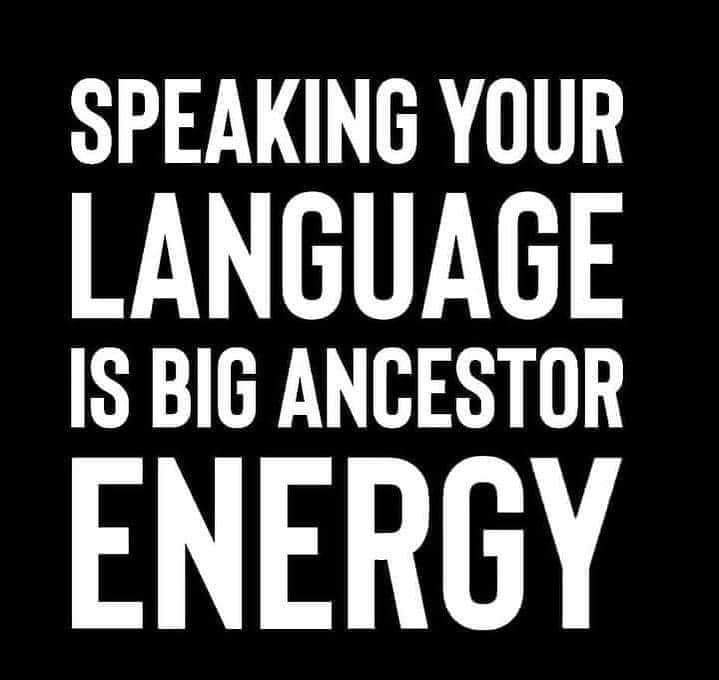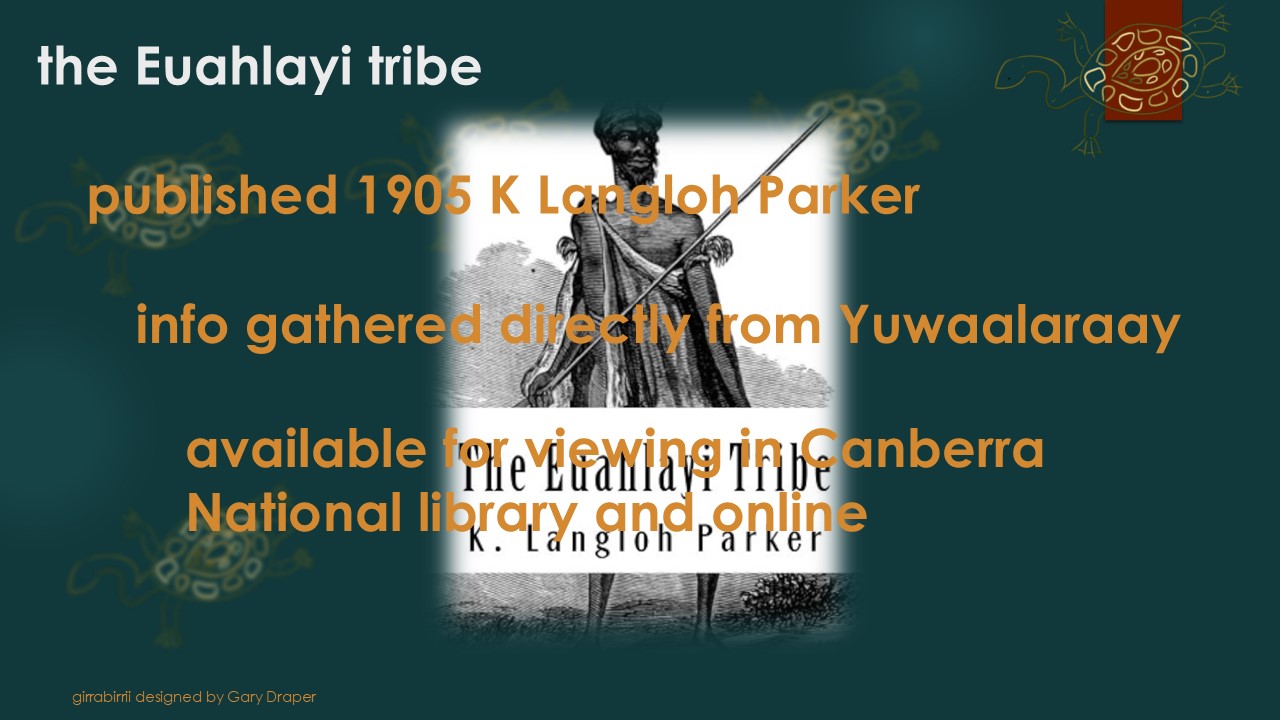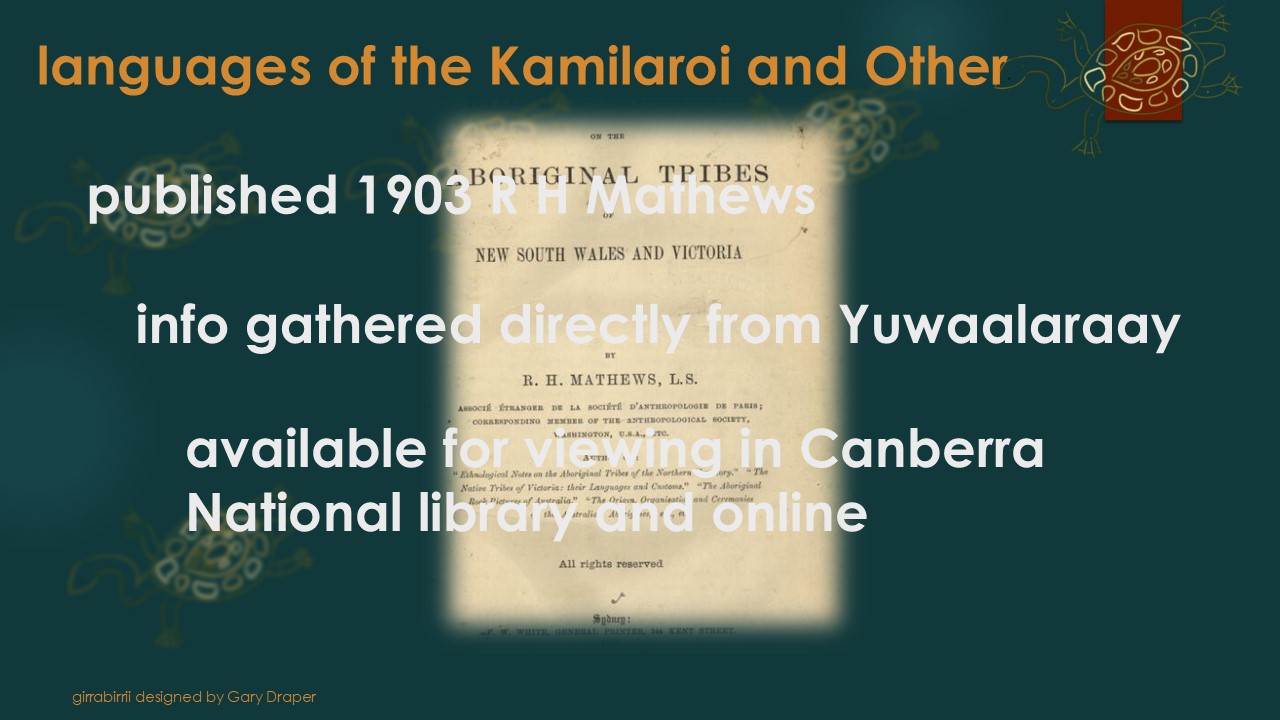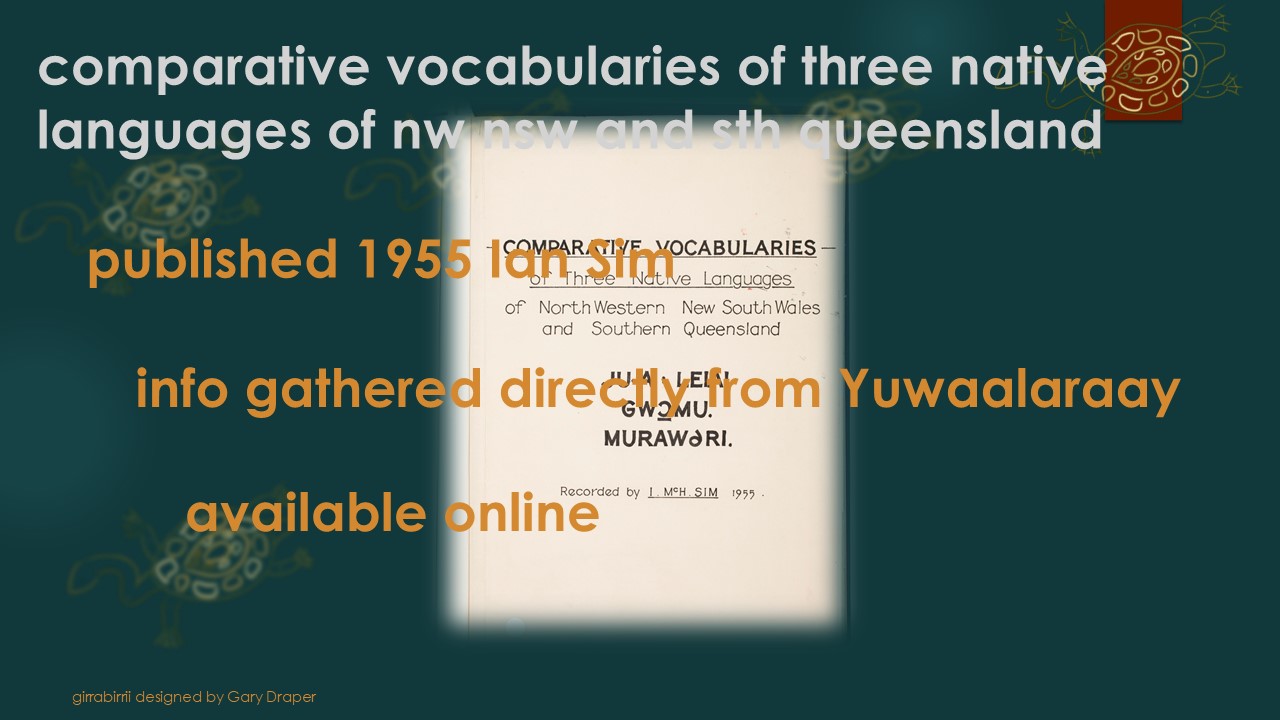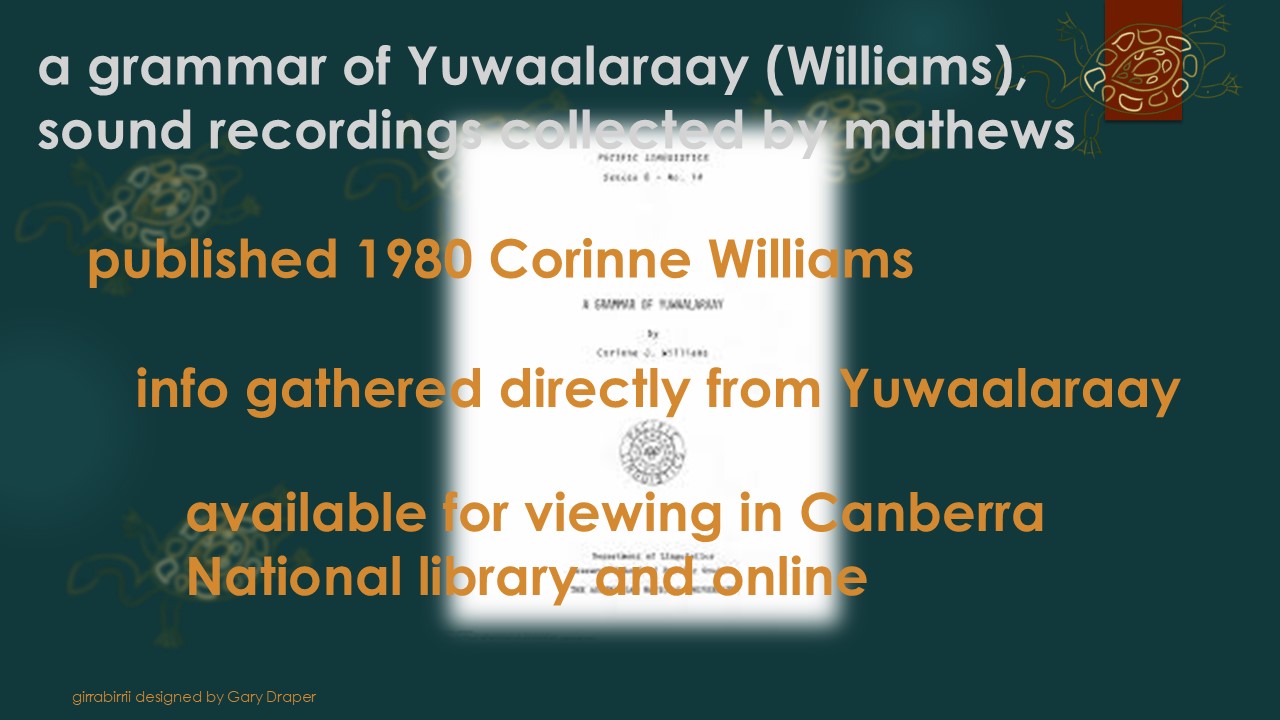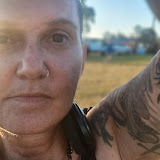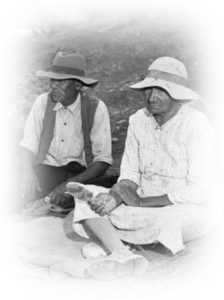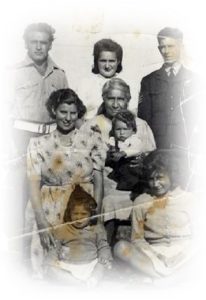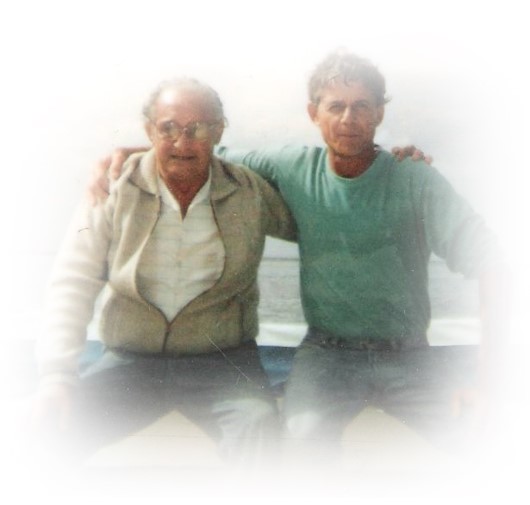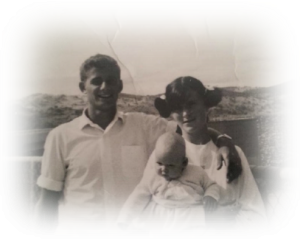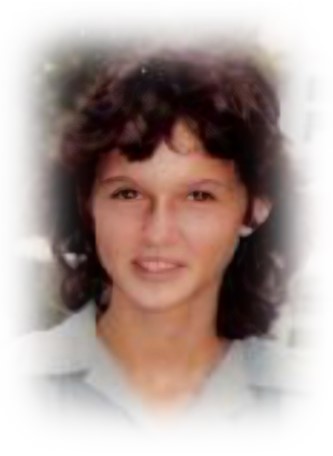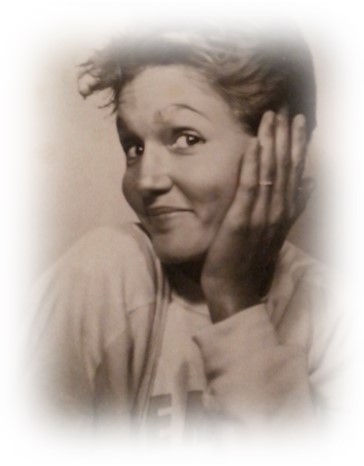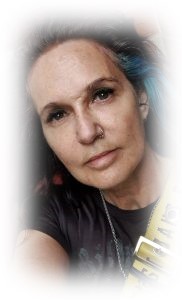Chapter 1
1
yaama and welcome to yaamanda yanay barriayaygu. Information about the project is below. I
thought I would start with how first so if doesn't suit you to ??? your time, you don't have to read through to get to
that part. I will talk of the how in more detail but basically a group of us (hoping for 10 to 20) and using some questions I have put
together, we are going to review some texts that published what our Ancestors shared, but might not have ????.
In a nutshell, I want to talk with other Yuwaalaraay people about the discrepancies in our language history
kinship
2
I am focusing on my direct Ancestors, Murruwarri and Yuwaalaraay which includes Uncle Jimmy Barker.
chapter 3
3
Indigenous Research is gathering, it does not find new but brings forward what has always
been. It requires PASSION to push past the wounds and not get lost in accusation and retribution, TRANSPARENCY to fairly steer the
exploration of methods that facilitate that kind of becoming, and CONNECTION to unlock what is of use for all of us to know rather than
speak on anyone's behalf. As an Indigenous Researcher, I am louder, I am less afraid.
Why I think it matters
x
Though the research question begins with ARE ALTERNATIVE UNDERSTANDINGS POSSIBLE, I am also interested in what happens when this request is brought, i.e. analyse historical conclusions, to us the Yuwaalaraay people with our history and capacity. It will strengthen Indigenous individual and community pride through contributing to historical interpretation, and recognise the diversity in Australian Indigenous language and geographic groups.
chapter 6
x
In Australia 2017, the New South Wales Government enacted the Aboriginal Languages Act,
proclaiming our right to control the growth and nurturing of our languages. But from what form are we now nurturing? Like our Stolen
Generations, languages were taken and reared to fit the colonised world. They were not swaddled in Indigenous Data Sovereignty when
utilised by Colonisers to navigate our continent. They were not framed in Ancestral context when analysed in anthropological
periodicals and they were not able to be given wholly when Australian laws forced them to be spoken in secret to be passed on. While it
is celebratory that our data warriors have made known the damage of colonised research, the availability of unsubstantiated findings
continue to be delivered as truth. It is a restricted view, and as a modern Yuwaalaraay Yinarr learning language I ask myself if that
means I am a carrier of that condensed colonised version of my people?
This research invites participants to explore the original language collections by asking Yaamanda yanay barriyaygu? (Will you come to
the window). Titled Barriyay for short, the framework views texts from four vantage points in time and being. Utilising constructivist
approaches informed by Narrative Practice, Standpoint Theory, and Indigenous Knowledge Methods, the framework aims to keep open a
dialogue about how data might be revised, disappear, or otherwise be reconfigured by prioritising in-place relations of research work
and keeping active the social practices of kin that keeps knowledge what it is. In Barriyay, participants do not speak for their
Ancestors but contribute alongside them making visible their social, material, and semantic configurations that reveal and propose
different requirements for authorisation and continuation of stories.
It is an an emergent empirical analysis supported by Aboriginal Yarning, a form of knowledge making in a collective trust where people
lean on multiple senses, stories, histories and individual particularities to connect to and build upon collective traditions. Barriyay
is being utilised to support clients in the therapy space to deconstruct historical trauma. The workshop will be delivered by
Yuwaalaraay Yinarr, Narrative Therapist and PHD candidate Jedison Wells. More information on the tool and the research study can be
found at https://www.hobajing.com.au/barriyayyaamanda/.
xx
x A summary of the project is below, and if you're interested in how I came to be the
person tending this research, please click here ours is an oral language, spelling is a wanda thing. If you have researched documents
on our people, you may have come across the words Yuwaalaraay, Ualarai, Eahurlari and other forms of spelling. SPELLING DOES NOT MATTER
IN AN ORAL LANGUAGE. But it can matter when we are researching because wanda used various forms to describe us
barriyay
add this link to the research website Please see the below link for your CoC recording from yesterday: [https://charlesdarwinuni.zoom.us/rec/share/ECKuEIp6je2qF5pJG7R8MzSKp4fhJYDAaliRjtf8S_U6KQqZ5jPyNeAEwurxycVe.npj759DC2umTWTOw?startTime=1724113807000] Passcode: $2YJk@XT
how did i get here
x
it's more about what i am referring to
I was born in Brisbane, Queensland 10 years before the official stolen generation policies stopped and 6 months after Aboriginal
people were recognised as citizens. I spent the first 34 years of my life in a suburb called Wynnum. My mother was born in Bellshill
in Scotland and my father is Aboriginal and Irish. My great grandmother Ada Hooper was born on Tinnenburra Station to Lizzie and
Samuel Hooper, and she had my grandfather Colin in Cunnamulla. It is from this web of people that the most reliable knowledge comes
about our connections to Yuwaalaraay and Muruwari.
Language was not freely shared in my childhood as my Ancestors were forced to give it up as part of the cost of exemption
certificates. I started to learn Yuwaalaraay language from early historical books like The Euahlayi Tribe by K. Langloh Parker and
sound recordings by Janet Mathews but without daily practice or access to other speaker, I was just parroting. During Covid, Dubbo
tafe began online classes run by elders Aunty Beth and Uncle John. These learning yarns gave me a new understanding of the purpose
and reason [words Uncle John would never let us forget] of language and each word within it. It is from this web of people that I
realised I had been learning how to say Yuwaalaraay, but not how to tell it.
After the courses finished, i started two facebook groups, dhubaanmala to keep in touch with other speakers, and tinnenburra-baa to
increase Hooper / Johnston connection across the borders. I am not yet fluent and may never be but I practice everyday. Even with the
limited knowledge I have so far of Yuwaalaraay, it is enough to highlight the differences that I now see between what was collected
from our Ancestors and what they were reported as saying.
I am not referring to sterotyped opinion like that of Mitchell (1852) in the excerpt above, ignorant sentiments that fed a nation's
view. My focus is on Authors who were collecting information, language etc directly from our people but rather than check purpose and
reason, they started to create "facts' from their own assumptions. F or instance, Barlow in the passage below, where our Ancestors
appear to not have the capacity to count rather than the truth of having no need for high numbers. It is almost like the Collecters
moulded our words into a colonised view.
Nowadays, research methods and ways of recording history are much more inclusive with cultural knowledge holders having more control
in clarification and publication. For language research, it means our culture and purpose are recognised as part of the words, and
the words are recognised as part of the culture and purpose. Much of this came about because of the courage of past Indigenous
researchers who not only acknowledged the absence of our voice but created new methods to ensure it would be heard. .
While that change is itself a cause for celebration, for me it is important that it is not left at that as all unclarified historical
research impacts future studies as it constricts the view of the past. Our new knowledge holders, our emerging elders, who now have
wider access to the world and less access to community and elder confirmation will find these Ancestoral voices when looking up
historical records but they will hear them within the limitations of how they were first collected.
So in my Masters year, I focused on ideas on how to deconstruct historical knowledge from a few different vantage points. Armed with
my new found ideas and many language misinterpretations, I approached Charles Darwin University and told them that many words and
pronounciations and nuances do not align with the knowledges handed down in community and that I was worried that what we are now
nurturing is a colonial interpretation of what our Ancestors shared. They said, hey why don't you research it!
Our languages were collected because they thought we would die out
x
- , and you and us and them leant on that knowledge to live in the world. Institutional knowledge making, and how this holds fixed certain stories of self, but also of peoples. has the impact of clouding future studies and ??? of future knowledge holders.
but new set of relationship .. appropriate practices associated with the language are lived between you and me and the others
While there may be truth that we do not, in the English sense of the terms, collect things or archive things or record things, we do things and we get together and share things. Doing research is an important part of the practice.
The central theme that threads throughout our (research) practices is whatever the opposite of “Othering” is. A widely used term in reference to exclusion of a people, first blessed upon me in Evans, tebrakunna country and Lee (2022). I am yet to find an exact description as it ascends inclusion and respect.
Combined with Wilson (2008) RESEARCH CONDUCTED ON AND BY INDIGENOUS PEOPLES - that I will extend my exploration into other Yuwaalaraay and Muruwari texts. - but the primary source was not utilised for clarification, only for collection
what makes me any different
x
I am accountable, not like Mitchell – to the framework of acceptable knowledge collection of the time. Not like Oates – incorporating and acknowledging respective practices. But like fellow Yuwaalaraay, who have held the knowledge up against the light and saw different kinds of knowers and practices of knowing that were mutually present, and never acknowledged.
what is a maniilayndindaay and Wanda?
x
i had to find a word for researcher. There are words for wisdom and discussion and talk and find but none of them seem to fit. The world of my Yuwaalaraay has changed and I needed a title that would signify a data hunter.
- There have always been data hunters, in every culture, the role, the identity is not new, the wording, the placement of that role is new
why only Yuwaalaraay, why not Muruwari too
i have every intention of doing the same with Muruwari, but don't quite have the fluency
in the language. I would have preferred to focus on both languages
it's more about what i am referring to
How we determine how to go forward
x
xx
consent forms
x
it's more about what i am referring to
A bit about me
The knowledges that I have stem from a family of scottish immigrants wanting a new life and tarnished as trash and an Aboriginal family wanting an old life and tarnished as trash.
I am a descendent of the Yuwaalaraay and Muruwuri peoples who come from the land of what is now known as NSW and QLD border, and the Scots whose land is currently claimed by British Ownership. I was born in Brisbane in QLD 10 years before Aboriginal people were recognised as
citizens. I spent the first 34 years of my life in a suburb called Wynnum. My great grandmother Ada Hooper was born on Tinnenburra Station to Lizzie and Samuel Hooper, and she had my
grandfather Colin in Cunnamulla. It is from them that the most reliable knowledge comes about our connections to Yuwaalaraay and
Muruwari. My father and I survived the generation of exemption.
There are changemakers and there are gatekeepers and Aboriginality needs both. I have a set of skills born from biology, experience and history that points me in the Gatekeeper direction
My story
I am a descendent of the Yuwaalaraay and Muruwuri peoples who come from the land of what is now known as NSW and QLD border, and the Scots whose land is currently claimed by British Ownership. I was born in Brisbane in QLD 10 years before Aboriginal people were recognised as
citizens. I spent the first 34 years of my life in a suburb called Wynnum. My great grandmother Ada Hooper was born on Tinnenburra Station to Lizzie and Samuel Hooper, and she had my
grandfather Colin in Cunnamulla. It is from them that the most reliable knowledge comes about our connections to Yuwaalaraay and
Muruwari. My father and I survived the generation of exemption.
There are changemakers and there are gatekeepers and Aboriginality needs both. I have a set of skills born from biology, experience and history that points me in the Gatekeeper direction
in my career, I work with clients, to breakdown historical truths that were imposed by
others. Others such as parents, teachers, government, religion etc who had the power of definition in a particular circumstance. i
find that when people seek healing, they come clutching a story that they and others may only have considered from a select
viewpoint. i combine these skills with my cultural and life experiences to expand those viewpoints.
# why me
- gut response
- respect for experience and education
- deeply embedded instinctual connection to something that gives me information, gives me keys on how to go forward
- i am uniquely suited to the project
- mention language work
yaama, gayrr ngaya djidjidan. brisbane-da queensland gaanga-nhi ngaya. ngaya gi-yaa-nha gaay guwaa-li yuwaalaraay-gu
ngayagay english-gu gaay-a hello, myname is jedison. I was born in brisbane in queensland and I am going to talk in yuwaalaraay and english
nhama bubaa-dhi gary johnston this is my father gary johnston wynnum brisbane-da gaangi-nhi nguru he was born in wynnum in queensland
nhama gunii-dhi catherine wilson this is my mother catherine wilson bellshill-da scotland gaangi-nhi nguru she was born in bellshill in scotland
nhama dhilaagaah-dhi colin johnston this is my grandfather colin johnston cunnamulla-da brisbane gaangi-nhi nguru he was born in cunnamulla in queensland
garrimaay burrulbidi ngaya ada hooper ada hooper is my great grandmother ?? her life began on tinnenburra station and many of my great aunts and uncles were born and raised there
ada’s parents were samuel and lizzie hooper, and it is from them that the most reliable knowledgge comes about our lands. samuel being Yuwaalaraay and lizzie being Muruwari.
These are best guesses based on wisdom handed down through other families, records and our own mob yarns. If your ancestors are from Australian Aboriginal and/or Torres Strait Islander lands, you may already know of the colinisation methods used to move us, reduce us and assimilate us. And, as i’m finding out from this project, just because something was recorded by a whitefella, doesn’t make it true.
wuu-nhi-baa ngaya yinarr-baa aboriginality is my inheritance ngaya dhuwi dhurra-li WITH gaay-biyaay, girruu-biyaay ngayagay gaay guwaa-lda-ndaay i express my identity with words, truth and story telling waan ngaya dhayndalmuu narrative gaay wuu-na dhayn-gu gaay-a gamil guwaa-y my work as a narrative counsellor gives voice to peoples stories that have not been told
buwabil ngaarribu-dhi ngaya yuwaalaraay language is my legacy ngaya wuu-na biiba-gal balal ngiyaningu dhayn-gu gaay i give voice to the unwritten pages of our people bidjaay nhama yuwaalaraay ganungunda biiba-gal yuwaalaraay is the ink to those pages
ngarragaa bidjaay balal alas the ink is dry
nhama ngarray .. yilambiyal ngaya yuwaalaraay dhiirra-nhi biibabiiba-nhi old you see in the past, I learned language from historical books gaadhal ngaya-bala gi-la-nhi but I was only a parrot gaay gawaa-y guwaa-li yiyal nganha dhirra-li repetition only teaches me to say language
ngaya-laa bamba dhirra-nhi dhilaagaa ? yinarraa? TAFE-gu then I learnt properly from Elders at TAFE ngaya yilaambiyal-gu gaay giirruu yuwaalaraay winanga-y-la-nha I began to understand yuwaalaraay purpose and reason ngaya yilaambiyal-gu yuwaalaraay dhubaanma-y I began to tell language
then I went back to the history books
and their purpose and reason did not make sense
ngarranma-li-badhaay ngaya nginuhna let me show you
You can contact me by phone, text and marco polo on 043 555 0084, email at girrabirrii@proton.me or through messenger: jedda wells. Also, if you are passing through the lands of the Gundungurra (Robertson) we can catch up face to face and every few months I make the trek through Tubbagah (Dubbo), Yuwaalaraay (Lightning Ridge), Bigambul (Goondiwindi), Turrbal and Jagera (Brisbane), Kunja (Cunnamulla) and Muruwarri throughout that trek.
